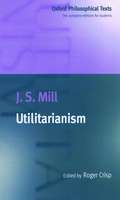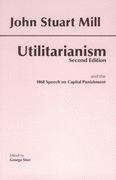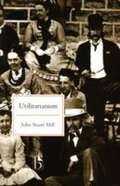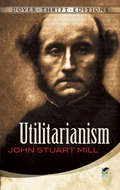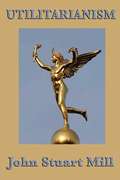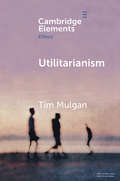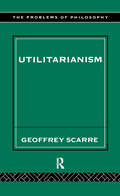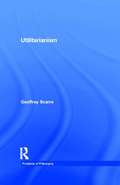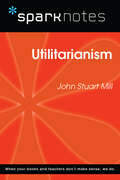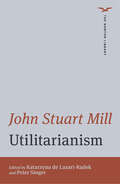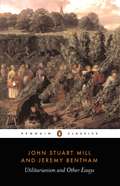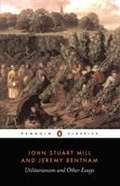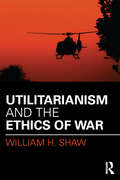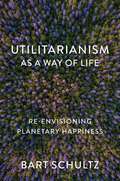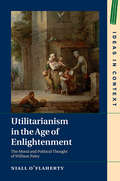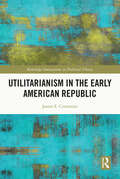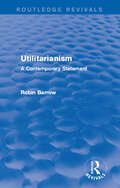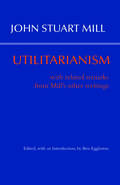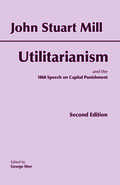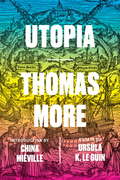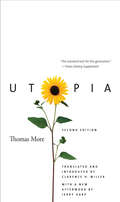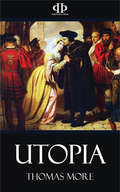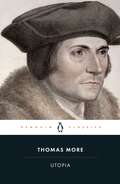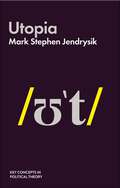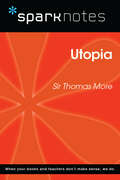- Table View
- List View
Utilitarianism
by Roger Crisp J. S. MillIntroduction to one of the most important, controversial, and suggestive works of moral philosophy ever written.
Utilitarianism
by John MillerMill defines the word "utilitarian" differently from the modern connotation of it, and describes the philosophy clearly and concisely. His speech on capital punishment is also included.
Utilitarianism
by John Stuart MillA major contribution in the history of ethics, Mill's brief treatise on utilitarianism lays the theoretical foundation for this branch of philosophy and outlines its relationship to other ethical systems, the arguments in its favor, and its implications for concerns about justice. The appendix contains the text of Mill's 1868 speech on capital punishment. An introductory chapter describes Mill's place in the history of philosophy and his contribution to the study of ethics.
Utilitarianism
by John Stuart MillHow do we decide what is "good" and what is "bad"? According to the ethical theory of Utilitarianism, to do good is to "always perform that act, of those available, that will bring the most happiness or the least unhappiness." By far the most widely read introduction to this theory, John Stuart Mill's Utilitarianism is one of the most important and controversial works of moral philosophy ever written.In this major contribution to ethical history, Mill's treatise defends the view that all human action should produce the greatest happiness overall, and that happiness itself is made up of "higher pleasures," such as the cultural, intellectual, and spiritual, and "lower pleasures," such as the physical. The relationship of utilitarian theory to other ethical systems, and powerful arguments in its favor--especially when concerning justice--are brilliantly discussed. How do we weigh options to maximize happiness for self and for those around us? From common-day dilemmas to large-scale social decisions, this exposition remains as relevant today as it was to intellectual and moral dilemmas of the nineteenth century.
Utilitarianism
by John Stuart MillsMill's Utilitarianism is one of the most important, controversial, and suggestive works of moral philosophy ever written. Mill defends the view that all human action should produce the greatest happiness overall, and that happiness itself is to be understood as consisting in "higher" and "lower" pleasures.
Utilitarianism (Elements in Ethics)
by Tim MulganMoral theories can be distinguished, not only by the answers they give, but also by the questions they ask. Utilitarianism's central commitment is to the promotion of well-being, impartially considered. This commitment shapes utilitarianism in a number of ways. If scarce resources should be directed where they will best promote well-being, and if theoretical attention is a scarce resource, then moral theorists should focus on topics that are most important to the future promotion of well-being. A theme of this Element is that, as times change, the priorities (both practical and theoretical) of utilitarianism also change. Questions that were once theoretical curiosities move centre stage. And themes from earlier utilitarians that have become unfashionable may come to the fore again. Utilitarianism is a living tradition, not an abstract set of timeless principles or a purely historical artefact.
Utilitarianism (Problems Of Philosophy Ser.)
by Geoffrey ScarreSurveying the historical development and the present condition of utilitarian ethics, Geoffrey Scarre examines the major philosophers from Lao Tzu in the fifth century BC to Richard Hare in the twentieth. Utilitarianism traces the 'doctrine of utility' from the moralists of the ancient world, through the Enlightenment and Victorian utilitarianism up to the lively debate of the present day. Utilitarianism today faces challenges on several fronts: it cannot warrant the drawing of adequate protective boundaries around the essential interests of individuals, and it does not allow them the space to pursue the personal concerns which give meaning to their lives. Geoffrey Scarre considers these and other charges, and concludes that whilst utilitarianism may not be a faultless moral doctrine, its positions are relevant, and significant today. Written with undergraduates in mind, this is an ideal course book for those studying and those teaching moral philosophy.
Utilitarianism (Problems of Philosophy)
by Geoffrey ScarreSurveying the historical development and the present condition of utilitarian ethics, Geoffrey Scarre examines the major philosophers from Lao Tzu in the fifth century BC to Richard Hare in the twentieth. Utilitarianism traces the 'doctrine of utility' from the moralists of the ancient world, through the Enlightenment and Victorian utilitarianism up to the lively debate of the present day. Utilitarianism today faces challenges on several fronts: it cannot warrant the drawing of adequate protective boundaries around the essential interests of individuals, and it does not allow them the space to pursue the personal concerns which give meaning to their lives. Geoffrey Scarre considers these and other charges, and concludes that whilst utilitarianism may not be a faultless moral doctrine, its positions are relevant, and significant today. Written with undergraduates in mind, this is an ideal course book for those studying and those teaching moral philosophy.
Utilitarianism (SparkNotes Philosophy Guide)
by SparkNotesUtilitarianism (SparkNotes Philosophy Guide) Making the reading experience fun! SparkNotes Philosophy Guides are one-stop guides to the great works of philosophy–masterpieces that stand at the foundations of Western thought. Inside each Philosophy Guide you&’ll find insightful overviews of great philosophical works of the Western world.
Utilitarianism (The Norton Library #0)
by John Stuart MillAbout Utilitarianism Edited by Katarzyna de Lazari-Radek and Peter Singer, “the acknowledged heirs of the founders of utilitarianism” (Jeff McMahan), the Norton Library edition of Utilitarianism features the complete text of the seventh (1879) edition, preceded by a thorough introduction to the work’s historical and intellectual contexts. Extensive endnotes clarify obscure terms and provide detailed analysis of the most philosophically significant passages, helping students to understand and critically engage with “the most famous defense of the utilitarian view ever written” (Geoffrey Scarre).
Utilitarianism and Other Essays
by John Stuart Mill Jeremy BenthamOne of the most important nineteenth-century schools of thought, Utilitarianism propounds the view that the value or rightness of an action rests in how well it promotes the welfare of those affected by it, aiming for 'the greatest happiness of the greatest number'. Jeremy Bentham (1748-1832) was the movement's founder, as much a social reformer as a philosopher. His greatest interpreter, John Stuart Mill (1806-73), set out to humanize Bentham's pragmatic Utilitarianism by balancing the claims of reason and the imagination, individuality and social well-being in essays such as 'Bentham', 'Coleridge' and, above all, Utilitarianism. The works by Bentham and Mill collected in this volume show the creation and development of a system of ethics that has had an enduring influence on moral philosophy and legislative policy.
Utilitarianism and other Essays
by J. S. Mill Jeremy BenthamHundreds of bold, imaginative men--celebrities as well as everyday heroes--share here their most intimate desires, deepest fears, and most fervent cravings for renewal. Decade by decade, Sheehy uncovers the real issues facing men today: finding new passion and purpose to invigorate the second half of their lives, dealing with "manopause," surviving job change, enjoying post-nesting zest, defeating depression, and learning what keeps a man young.
Utilitarianism and the Ethics of War (War, Conflict and Ethics)
by William H. ShawThis book offers a detailed utilitarian analysis of the ethical issues involved in war. Utilitarianism and the Ethics of War addresses the two basic ethical questions posed by war: when, if ever, are we morally justified in waging war, and if recourse to arms is warranted, how are we permitted to fight the wars we wage? In addition, it deals with the challenge that realism and relativism raise for the ethical discussion of war, and with the duties of military personnel and the moral challenges they can face. In tackling these matters, the book covers a wide range of topics—from pacifism to armed humanitarian intervention, from the right of national defense to pre-emptive or preventive war, from civilian immunity to the tenets of just war theory and the moral underpinnings of the rules of war. But, what is distinctive about this book is that it provides a consistent and thorough-going utilitarian or consequentialist treatment of the fundamental normative issues that war occasions. Although it goes against the tide of recent work in the field, a utilitarian approach to the ethics of war illuminates old questions in new ways by showing how a concern for well-being and the consequences of our actions and policies shape the moral constraints to which states and other actors must adhere. This book will be of much interest to students of the ethics of war, just war theory, moral philosophy, war and conflict studies and IR.
Utilitarianism as a Way of Life: Re-envisioning Planetary Happiness
by Bart SchultzUtilitarianism – a commitment to ‘the greatest happiness for the greatest number’ – has been the target of endless opposition. According to its critics, it ignores the separateness of persons, cannot secure the protections of basic rights, demands extreme sacrifice, can justify anything – the list goes on. It has been implicated in the horrors of settler colonialism, imperialism, and racial capitalism, both historically and today, as the neoliberal world order faces a profound legitimation crisis.Bart Schultz argues that utilitarian philosophy must be decolonized and reimagined for the current moment: a time of new and looming existential threats, in a world desperate for social change. Where dominant ethical and political approaches have failed to adequately deal with the enormous challenges we face, utilitarianism – as a set of lived practices, not simply a theoretical construction – may hold out some hope of seriously addressing them. Drawing on alternatives to the well-known Eurocentric story of utilitarianism (and an extensive review and critique of that story) and incorporating the works of Peter Singer, Katarzyna de Lazari-Radek, Derek Parfit, Martha Nussbaum, and other major philosophers, Schultz crafts a groundbreaking new framework of utilitarianism born of struggle and resistance.Utilitarianism as a Way of Life is an essential text for scholars and students of philosophy, political science, economics, decolonization studies, gender studies, psychology, environmental studies, and related fields.
Utilitarianism in the Age of Enlightenment: The Moral and Political Thought of William Paley (Ideas in Context #118)
by Niall O'FlahertyThis is the first book-length study of one of the most influential traditions in eighteenth-century Anglophone moral and political thought, 'theological utilitarianism'. Niall O'Flaherty charts its development from its formulation by Anglican disciples of Locke in the 1730s to its culmination in William Paley's work. Few works of moral and political thought had such a profound impact on political discourse as Paley's Principles of Moral and Political Philosophy (1785). His arguments were at the forefront of debates about the constitution, the judicial system, slavery and poverty. By placing Paley's moral thought in the context of theological debate, this book establishes his genuine commitment to a worldly theology and to a programme of human advancement. It thus raises serious doubts about histories which treat the Enlightenment as an entirely secular enterprise, as well as those which see English thought as being markedly out of step with wider European intellectual developments.
Utilitarianism in the Early American Republic (Routledge Innovations in Political Theory)
by James E. CrimminsIn Utilitarianism in the Early American Republic James E. Crimmins provides a fresh perspective on the history of antebellum American political thought. Based on a broad-ranging study of the dissemination and reception of utilitarian ideas in the areas of constitutional politics, law education, law reform, moral theory and political economy, Crimmins illustrates the complexities of the place of utilitarianism in the intellectual ferment of the times, in both its secular and religious forms, intersection with other doctrines, and practical outcomes. The pragmatic character of American political thought revealed—culminating in the postbellum rise of Pragmatism—stands in marked contrast to the conventional interpretations of intellectual history in this period. Utilitarianism in the Early American Republic will be of interest to academic specialists, and graduate and senior undergraduate students engaged in the history of political thought, moral philosophy and legal philosophy, particularly scholars with interests in utilitarianism, the trans-Atlantic transfer of ideas, the American political tradition and modern American intellectual history.
Utilitarianism: A Contemporary Statement (Routledge Revivals)
by Robin BarrowIn this book, first published in 1991, the author Dr Robin Barrow adopts the view that utilitarianism is the most coherent and persuasive ethical theory we have and argues in favour of a specific form of rule-utilitarianism. This book will be of interest to students of philosophy.
Utilitarianism: With Related Remarks from Mill's Other Writings
by John Stuart Mill Ben EgglestonThis edition supplements the text of Mill's classic essay with 58 related remarks carefully selected from Mill's other writings, ranging from his treatise on logic to his personal correspondence. In these remarks, Mill comments on specific passages of Utilitarianism, elaborates on topics he handles briefly in Utilitarianism, and discusses additional aspects of his moral thought. Short introductory comments accompany the related remarks, and an editor's introduction provides an overview of Utilitarianism crafted specifically to enhance accessibility for first-time readers of the essay.
Utilitarianism: and the 1868 Speech on Capital Punishment (Hackett Classics)
by John Stuart MillThis expanded edition of John Stuart Mill's Utilitarianism includes the text of his 1868 speech to the British House of Commons defending the use of capital punishment in cases of aggravated murder. The speech is significant both because its topic remains timely and because its arguments illustrate the applicability of the principle of utility to questions of large-scale social policy.
Utopia
by Thomas More China Miéville Ursula K. LeguinFive-hundred-year anniversary edition of More's Utopia, with writing from major science fiction writersFive hundred years since its first publication, Thomas More's Utopia remains astonishingly radical and provocative. More imagines an island nation where thousands live in peace and harmony, men and women are both educated, and property is communal. In a text hovering between fantasy, satire, blueprint and game, More explores the theories and realities behind war, political conflicts, social tensions and redistribution, and imagines the day-to-day lives of a citizenry living free from fear, oppression, violence and suffering. But there has always been a shadow at the heart of Utopia. If this is a depiction of the perfect state, why, as well as wonder, does it provoke a growing unease? In this quincentenary edition, published in conjunction with Somerset House, More's text is introduced by multi-award-winning author China Miéville and accompanied by four essays from Ursula K. Le Guin, today's most distinguished utopian writer and thinker..From the Trade Paperback edition.
Utopia
by Thomas More Clarence H. Miller Jerry HarpSaint Thomas More's Utopia is one of the most important works of European humanism and serves as a key text in survey courses on Western intellectual history, the Renaissance, political theory, and many other subjects. Preeminent More scholar Clarence H. Miller does justice to the full range of More's rhetoric in this masterful translation. In a new afterword to this edition, Jerry Harp contextualizes More's life and Utopia within the wider frames of European humanism and the Renaissance."Clarence H. Miller's fine translation tracks the supple variations of More's Latin with unmatched precision, and his Introduction and notes are masterly. Jerry Harp's new Afterword adroitly places More's wonderful little book into its broader contexts in intellectual history."--George M. Logan, author of The Meaning of More's "Utopia""Sir Thomas More's Utopia is not merely one of the foundational texts of western culture, but also a book whose most fundamental concerns are as urgent now as they were in 1516 when it was written. Clarence H. Miller's wonderful translation of More's classic is now happily once again available to readers. This is the English edition that best captures the tone and texture of More's original Latin, and its notes and introduction, along with the lively afterward by Jerry Harp, graciously supply exactly the kinds of help a modern reader might desire."--David Scott Kastan, Yale University
Utopia
by Thomas MoreDesignedly fantastic in suggestion of details, “Utopia” is the work of a scholar who had read Plato’s “Republic,” and had his fancy quickened after reading Plutarch’s account of Spartan life under Lycurgus. Beneath the veil of an ideal communism, into which there has been worked some witty extravagance, there lies a noble English argument.
Utopia
by Thomas More'It remains astonishingly radical ... one of Utopia's most striking aspects is its contemporaniety' Terry EagletonIn Utopia, Thomas More gives us a traveller's account of a newly-discovered island where the inhabitants enjoy a social order based on natural reason and justice, and human fulfilment is open to all. As the traveller describes the island, a bitter contrast is drawn between this rational society and the practices of Europe. How can the philosopher reform his society? In his discussion, More takes up a question first raised by Plato and which is still a challenge in the contemporary world. In the history of political thought few works have been more influential than Utopia, and few more misunderstood.Translated and introduced by Dominic Baker-Smith
Utopia (Key Concepts in Political Theory)
by Mark Stephen JendrysikHuman beings universally dream of a better world. For centuries they have expressed their yearning for ways of life that are free from oppression, want and fear, through philosophy, art, film and literature. In this concise and engaging book, Mark Jendrysik examines the multifarious ways utopians have posed the question of how human beings might establish justice and realize truly human values. Drawing upon a range of sources, from Plato’s Republic and Thomas More’s Utopia to Ursula Le Guin’s The Dispossessed, he argues that, though for many utopia means ‘demanding the impossible’, the goals that seemed out of reach for one generation are often realized in the next. Nonetheless, he shows that, while utopian thought points toward our most noble aspirations, it also illustrates the dangers of totalitarianism, of the surveillance state and of global climate change. This engaging book will be an invaluable guide for anyone seeking to understand how, for good or ill, utopian aspirations shape our lives, even in times that seem designed to close off dreams of a better world.
Utopia (SparkNotes Philosophy Guide)
by SparkNotesUtopia (SparkNotes Philosophy Guide) Making the reading experience fun! SparkNotes Philosophy Guides are one-stop guides to the great works of philosophy–masterpieces that stand at the foundations of Western thought. Inside each Philosophy Guide you&’ll find insightful overviews of great philosophical works of the Western world.
